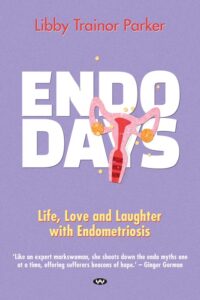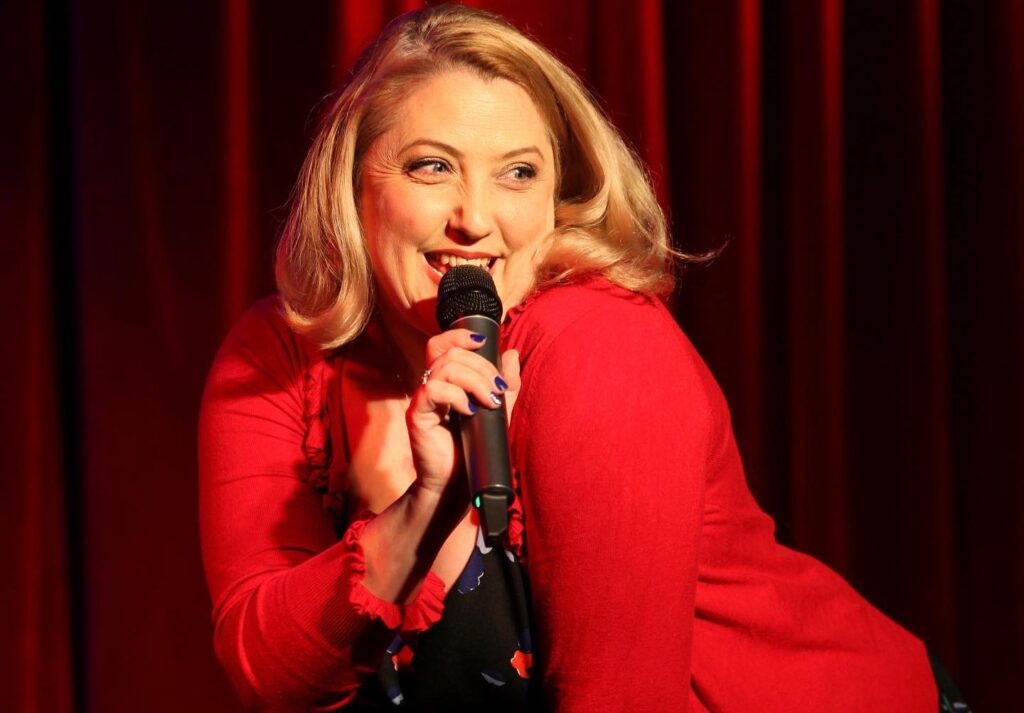Let’s start at the start. What is endometriosis? Who does it impact?
Endometriosis is a painful, chronic, incurable illness that affects one in nine people who menstruate. Gynaecologist and author Dr Susan Evans defines it as “a condition where bits of tissue like the lining of the uterus are found in places outside the uterus where they shouldn’t be”. Endometriosis symptoms can include, but are not limited to: debilitating pain during periods, abdominal bloating, nausea, fatigue, low mood and depression, anxiety, pain with sex, adhesions, painful bowel movements and/or urination, chronic pelvic pain, and infertility.
Patients can have some, none or all of those symptoms. There are four stages of endometriosis with one being the least endometriosis lesions and four being the most, but there is no correlation between stages of endo and levels of pain.
You could have stage one endo and severe pain or stage four endo and no pain. We still have tons to do in terms of research and awareness to work out why and how that is so.
Tell us a bit about your own endo story and how it’s impacted your life?
I was born and raised in Canberra and moved to Adelaide at 14 years old. Just when we were about to move, I had a sudden attack of abdominal pain and I fainted on our icy cold Canberra bathroom tiles. My mum suggested it was probably period pain because she suffered similar and was a fainter as well. Later that day, I got my first period. Figuring it was normal and just the way period pain worked, I got on with my life, and we moved to Adelaide where I endured these painful, dizzy and nauseating episodes every month.
When I was 19, I had a working holiday in Cairns where a friend told me she’d been diagnosed with ‘endometriosis’ and described her symptoms to me. They matched my own, so I took myself off a doctor and he sent me away with a diagnosis of ‘partying too hard’ after chastising me for diagnosing myself (where did you get your medical degree? he asked).
At 22, I was back on the east side, living in Jindabyne and working at Blue Cow Mountain. I woke early one morning in severe pain, staggered to my local GP and promptly collapsed on the waiting room floor. I was whisked off in an ambulance to Cooma and my appendix was whipped out.
My surgeon visited me after the procedure and said he’d removed a healthy appendix. I asked, what’s wrong with me, then? And he said, You’ve probably just got your knickers in a twist over something.
Back in Adelaide for many years, I visited doctors complaining of pain, only to be told it was all in my head, until I was 35 and pregnant with a much-wanted baby that turned out to be a cornual ectopic pregnancy (a rare and dangerous condition where implantation occurs on the outside corner or in the cavity of the ‘horn’ of the uterus). This was the first of 11 pregnancy losses and no surviving pregnancies.
After having the ectopic removed via caesarean surgery, I was in more pain than ever, so I kept going back to my specialist asking for help and he kept saying I was fine, just grieving and/or stressed (eg, all in my head). After 12 months of dismissal, he reluctantly agreed to do a diagnostic laparoscopy but assured me there was nothing wrong with me. That surgery revealed stage four endometriosis. Finally, I had answers. Finally, it wasn’t all in my head. Finally, I could start healing. Because, when you spend 22 years trying to fix a head that isn’t sick, your head gets a little sick. So, I had a lot of work to do to forgive myself.

The cover “Endo Days.”
In a nutshell, what’s your book about?
Endo Days is a journalistic memoir that’s part narrative, part instruction manual and part comedy routine. It threads my story through interviews with a diverse range of ‘endo friendos’ across Australia, including the experiences of trans, queer, neurodivergent, younger, older, First Nations, metropolitan and rural Australians. The book offers tips and tricks for living well with chronic illness and takes the reader through my journey from misdiagnosis to treatment, through medical gaslighting, pregnancy losses, raising step-kids and a foster son, and working towards educating others.
Why did you write it?
When I was first diagnosed, I was angry and confused. I was sent home with this word, ‘endometriosis’ but no further information. I googled and was even more confused. I am a teacher by trade, so I immediately wanted to get some resources out there for people like me who were diagnosed late and feeling lost in the void.
But I also wanted to educate 14-year-old me (and her mum) that pain like that isn’t normal and there are better ways we can advocate for ourselves.
So when Wakefield Press approached me to write the book I knew I wanted to write the resource that would have helped me when I was first trying to navigate this illness.
You actually have a comedy how about endo and your book is quite funny in parts too. Why take this approach?
Someone once said to me, ‘there’s nothing funny about chronic illness’ and that felt like a challenge!
In my family, we have always used humour to diffuse tragic, difficult or awkward situations and my journey through endometriosis has been all of those things. But I also learn best through laughing. My husband Matt and I wrote our comedy cabaret (also called Endo Days) about our experiences with endo together.
In the show, we sing and joke about things like pain, the partner experience, medical gaslighting, fertility issues, being excluded from the ‘Mum Club’ because I didn’t birth my three children, unsolicited advice (have you tried yoga?) and there’s even a rap about suppositories. The show is great fun and a well-earned laugh for people with pain and their supporters.
It’s therapeutic for me as well, but the best bit is giving people who feel like there’s no hope and nothing out there for them an hour of comedy and song that is entirely relatable and allows them to feel validated and important, which they deserve.

Libby Trainor Parker is also a comedian. Picture Supplied/Craig Egan
A huge concern all through your book is gaslighting by the medical profession. Unpick this for us.
It took two decades for me to be diagnosed with endometriosis. I went to so many doctors complaining of pain, moods, fertility issues, bloating, nausea, bladder and bowel pain. And every time, I was told it was stress and anxiety, tiredness or a mystery virus. I was never referred to a gynaecologist until an ectopic pregnancy accidentally took me to a specialist who also said it was in my head, but who finally diagnosed me.
Endometriosis, in addition to many illnesses that affect women and people assigned female at birth, is still underfunded, under-researched and lacking awareness. Many of us are sent away with a prescription of ‘paracetamol and a lie down’ or ‘get some exercise and take up a hobby’ or ‘deal with it, it’s a women’s lot’. One woman told me a story that she was instructed by a GP to, ‘have an affair because then you’ll lose weight and feel better about yourself and your pain will go away’.
But it’s hard for doctors as well, especially GPs, because they are expected to be experts on everything from coldsores to cancer, so they need us to know our bodies better so we can go to see them armed with more information and the confidence to describe our symptoms better.
And I think things are changing. We are talking more. There is more information out there and, what was once a taboo topic is becoming more acceptable to discuss.
I see a generation of younger people coming through who are gutsier and more informed than I ever was and it gives me hope that endometriosis will be easily diagnosed and treated in the near future.
You also delve into all the endo myths. Give us an example.
Patients are often told pregnancy or hysterectomy will cure endometriosis, but there is not yet a cure for endo. People are also often told endo causes infertility, but that is also not always the case. There is so much that is unknown about endometriosis, but telling someone to get pregnant or have a hysterectomy before they’re ready to is extreme and dangerous!
If people take one thing away from your book, what would you like it to be?
I want people with endometriosis to feel seen, heard, understood and validated, and I want them to know they are not alone. There are people fighting for them every day and working hard to get this illness better recognised so we can fix it. I want them to know there is change on the horizon and there is hope. I want partners, parents, supporters and health practitioners to feel acknowledged and that we are grateful to them.
Living with chronic illness is so hard and we’re all doing our best. We can’t be warriors every day. Some days, I’m too tired to fight and I go back to bed and try again tomorrow. And that’s okay. I want people with endo to know that they’re enough, what they’re doing is enough and I’m proud of them for surviving.
Is there anything else you want to say?
I am hoping to bring my show and book to Canberra, so please come and see me so I can be the Homecoming Queen.
The post Endometriosis isn’t funny. Libby doesn’t agree. appeared first on BroadAgenda.
This post was originally published on BroadAgenda.